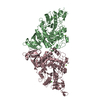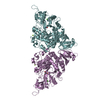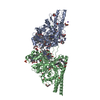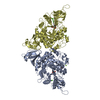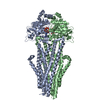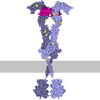[English] 日本語
 Yorodumi
Yorodumi- SASDDU8: Multidomain architecture of the estrogen receptor reveals interfa... -
+ Open data
Open data
- Basic information
Basic information
| Entry | Database: SASBDB / ID: SASDDU8 |
|---|---|
 Sample Sample | Multidomain architecture of the estrogen receptor reveals interfacial cross-talk between its DNA-binding and ligand-binding domains
|
| Function / homology |  Function and homology information Function and homology informationregulation of epithelial cell apoptotic process / antral ovarian follicle growth / regulation of branching involved in prostate gland morphogenesis / RUNX1 regulates transcription of genes involved in WNT signaling / RUNX1 regulates estrogen receptor mediated transcription / regulation of toll-like receptor signaling pathway / nuclear estrogen receptor activity / epithelial cell development / steroid hormone receptor signaling pathway / epithelial cell proliferation involved in mammary gland duct elongation ...regulation of epithelial cell apoptotic process / antral ovarian follicle growth / regulation of branching involved in prostate gland morphogenesis / RUNX1 regulates transcription of genes involved in WNT signaling / RUNX1 regulates estrogen receptor mediated transcription / regulation of toll-like receptor signaling pathway / nuclear estrogen receptor activity / epithelial cell development / steroid hormone receptor signaling pathway / epithelial cell proliferation involved in mammary gland duct elongation / prostate epithelial cord elongation / prostate epithelial cord arborization involved in prostate glandular acinus morphogenesis / mammary gland branching involved in pregnancy / uterus development / negative regulation of smooth muscle cell apoptotic process / vagina development / TFIIB-class transcription factor binding / androgen metabolic process / mammary gland alveolus development / cellular response to estrogen stimulus / estrogen response element binding / Mitochondrial unfolded protein response (UPRmt) / nuclear receptor-mediated steroid hormone signaling pathway / positive regulation of DNA-binding transcription factor activity / negative regulation of DNA-binding transcription factor activity / Nuclear signaling by ERBB4 / RNA polymerase II preinitiation complex assembly / positive regulation of nitric-oxide synthase activity / estrogen receptor signaling pathway / protein localization to chromatin / steroid binding / 14-3-3 protein binding / TFAP2 (AP-2) family regulates transcription of growth factors and their receptors / negative regulation of canonical NF-kappaB signal transduction / ESR-mediated signaling / negative regulation of miRNA transcription / TBP-class protein binding / nitric-oxide synthase regulator activity / nuclear estrogen receptor binding / transcription corepressor binding / transcription coregulator binding / stem cell differentiation / SUMOylation of intracellular receptors / cellular response to estradiol stimulus / euchromatin / beta-catenin binding / Nuclear Receptor transcription pathway / response to estrogen / transcription coactivator binding / male gonad development / nuclear receptor activity / positive regulation of fibroblast proliferation / Constitutive Signaling by Aberrant PI3K in Cancer / Regulation of RUNX2 expression and activity / positive regulation of nitric oxide biosynthetic process / sequence-specific double-stranded DNA binding / Ovarian tumor domain proteases / response to estradiol / PIP3 activates AKT signaling / positive regulation of cytosolic calcium ion concentration / ATPase binding / PI5P, PP2A and IER3 Regulate PI3K/AKT Signaling / regulation of inflammatory response / DNA-binding transcription activator activity, RNA polymerase II-specific / fibroblast proliferation / phospholipase C-activating G protein-coupled receptor signaling pathway / transcription regulator complex / Estrogen-dependent gene expression / DNA-binding transcription factor activity, RNA polymerase II-specific / calmodulin binding / Extra-nuclear estrogen signaling / RNA polymerase II cis-regulatory region sequence-specific DNA binding / chromatin remodeling / DNA-binding transcription factor activity / negative regulation of gene expression / chromatin binding / regulation of DNA-templated transcription / regulation of transcription by RNA polymerase II / protein kinase binding / chromatin / positive regulation of DNA-templated transcription / enzyme binding / negative regulation of transcription by RNA polymerase II / Golgi apparatus / signal transduction / positive regulation of transcription by RNA polymerase II / protein-containing complex / zinc ion binding / nucleoplasm / identical protein binding / nucleus / membrane / plasma membrane / cytoplasm / cytosol Similarity search - Function |
| Biological species |  Homo sapiens (human) Homo sapiens (human) |
 Citation Citation |  Journal: Nat Commun / Year: 2018 Journal: Nat Commun / Year: 2018Title: Multidomain architecture of estrogen receptor reveals interfacial cross-talk between its DNA-binding and ligand-binding domains. Authors: Wei Huang / Yi Peng / Janna Kiselar / Xuan Zhao / Aljawharah Albaqami / Daniel Mendez / Yinghua Chen / Srinivas Chakravarthy / Sayan Gupta / Corie Ralston / Hung-Ying Kao / Mark R Chance / Sichun Yang /  Abstract: Human estrogen receptor alpha (hERα) is a hormone-responsive nuclear receptor (NR) involved in cell growth and survival that contains both a DNA-binding domain (DBD) and a ligand-binding domain (LBD) ...Human estrogen receptor alpha (hERα) is a hormone-responsive nuclear receptor (NR) involved in cell growth and survival that contains both a DNA-binding domain (DBD) and a ligand-binding domain (LBD). Functionally relevant inter-domain interactions between the DBD and LBD have been observed in several other NRs, but for hERα, the detailed structural architecture of the complex is unknown. By utilizing integrated complementary techniques of small-angle X-ray scattering, hydroxyl radical protein footprinting and computational modeling, here we report an asymmetric L-shaped "boot" structure of the multidomain hERα and identify the specific sites on each domain at the domain interface involved in DBD-LBD interactions. We demonstrate the functional role of the proposed DBD-LBD domain interface through site-specific mutagenesis altering the hERα interfacial structure and allosteric signaling. The L-shaped structure of hERα is a distinctive DBD-LBD organization of NR complexes and more importantly, reveals a signaling mechanism mediated by inter-domain crosstalk that regulates this receptor's allosteric function. |
 Contact author Contact author |
|
- Structure visualization
Structure visualization
| Structure viewer | Molecule:  Molmil Molmil Jmol/JSmol Jmol/JSmol |
|---|
- Downloads & links
Downloads & links
-Data source
| SASBDB page |  SASDDU8 SASDDU8 |
|---|
-Related structure data
| Similar structure data |
|---|
- External links
External links
| Related items in Molecule of the Month |
|---|
-Models
| Model #2105 |  Type: atomic / Chi-square value: 1.378276 / P-value: 0.108697  Search similar-shape structures of this assembly by Omokage search (details) Search similar-shape structures of this assembly by Omokage search (details) |
|---|---|
| Model #2106 | 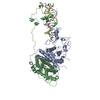 Type: atomic / Chi-square value: 1.194649 / P-value: 0.389292  Search similar-shape structures of this assembly by Omokage search (details) Search similar-shape structures of this assembly by Omokage search (details) |
| Model #2107 |  Type: atomic / Chi-square value: 1.245456 / P-value: 0.211077  Search similar-shape structures of this assembly by Omokage search (details) Search similar-shape structures of this assembly by Omokage search (details) |
- Sample
Sample
 Sample Sample | Name: Multidomain architecture of the estrogen receptor reveals interfacial cross-talk between its DNA-binding and ligand-binding domains Specimen concentration: 0.10-0.80 / Entity id: 1139 / 1143 / 1144 / 1145 / 1146 / 1147 |
|---|---|
| Buffer | Name: 10 mM CHES (pH9.5), 125 mM NaCl, 5mM KCl, 4 mM MgCl2, 50 mM arginine, 50 mM glutamate, 5 mM TCEP, 5% glycerol, 10 µm Zn acetate, 10 µM estradiol pH: 9.5 |
| Entity #1139 | Name: hERa CDE / Type: protein / Description: Estrogen receptor / Formula weight: 42.468 / Num. of mol.: 2 / References: UniProt: P03372 Sequence: ETRYCAVCND YASGYHYGVW SCEGCKAFFK RSIQGHNDYM CPATNQCTID KNRRKSCQAC RLRKCYEVGM MKGGIRKDRR GGRMLKHKRQ RDDGEGRGEV GSAGDMRAAN LWPSPLMIKR SKKNSLALSL TADQMVSALL DAEPPILYSE YDPTRPFSEA SMMGLLTNLA ...Sequence: ETRYCAVCND YASGYHYGVW SCEGCKAFFK RSIQGHNDYM CPATNQCTID KNRRKSCQAC RLRKCYEVGM MKGGIRKDRR GGRMLKHKRQ RDDGEGRGEV GSAGDMRAAN LWPSPLMIKR SKKNSLALSL TADQMVSALL DAEPPILYSE YDPTRPFSEA SMMGLLTNLA DRELVHMINW AKRVPGFVDL TLHDQVHLLE CAWLEILMIG LVWRSMEHPG KLLFAPNLLL DRNQGKCVEG MVEIFDMLLA TSSRFRMMNL QGEEFVCLKS IILLNSGVYT FLSSTLKSLE EKDHIHRVLD KITDTLIHLM AKAGLTLQQQ HQRLAQLLLI LSHIRHMSNK GMEHLYSMKC KNVVPLYDLL LEMLDAHRLH AP |
| Entity #1143 | Name: hERa_ERE1 / Type: DNA / Description: ERE1 / Formula weight: 5.909 / Num. of mol.: 1 / Source: Homo sapiens Sequence: TAGGTACACG TGACCTGCG |
| Entity #1144 | Name: hERa_ERE2 / Type: DNA / Description: ERE2 / Formula weight: 5.869 / Num. of mol.: 1 / Source: Homo sapiens Sequence: CGCAGGTCAC TGTGACCTA |
| Entity #1145 | Type: other / Description: Estradiol / Formula weight: 0.272 / Num. of mol.: 2 Sequence: C18H24O2 |
| Entity #1146 | Type: protein / Description: hERa peptide1 / Formula weight: 1.706 / Num. of mol.: 1 Sequence: KENALLRYLL DKDD |
| Entity #1147 | Type: protein / Description: hERa peptide2 / Formula weight: 1.706 / Num. of mol.: 1 Sequence: KENALLRYLL DKDD |
-Experimental information
| Beam | Instrument name: Advanced Photon Source (APS), Argonne National Laboratory BioCAT 18ID City: Lemont, IL / 国: USA  / Type of source: X-ray synchrotron / Wavelength: 0.103 Å / Dist. spec. to detc.: 3 mm / Type of source: X-ray synchrotron / Wavelength: 0.103 Å / Dist. spec. to detc.: 3 mm | |||||||||||||||||||||
|---|---|---|---|---|---|---|---|---|---|---|---|---|---|---|---|---|---|---|---|---|---|---|
| Detector | Name: MAR 165 CCD | |||||||||||||||||||||
| Scan | Measurement date: Aug 10, 2014 / Storage temperature: 4 °C / Cell temperature: 10 °C / Exposure time: 1.1 sec. / Number of frames: 20 / Unit: 1/A /
| |||||||||||||||||||||
| Distance distribution function P(R) |
| |||||||||||||||||||||
| Result | Comments: Additional SEC parameters: Column type: GE Healthcare Superdex 200 GL 10/300; Flow rate: 0.5 ml/min; Sample injection concentration: 3.5 mg/ml; Injection volume: 500 µl.
|
 Movie
Movie Controller
Controller

